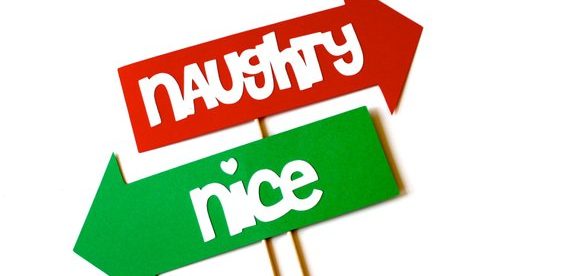We’re Gonna Find Out Who’s Naughty and Nice

Awesome. Phenomenal. Wonderful. Fabulous. These are all words that one might use to emphatically articulate one’s appreciation for someone or something. And unless given more context — a sarcastic tone or adding an -ly and then a word like “stupid” after — the positive connotation behind these words is usually unambiguous. If you’re using them, you’re saying something nice.
But can the same be said for the word “nice” itself? Think about it for a minute: the word “nice” is something you use when a stronger term of affection isn’t appropriate. Sometimes, that’s because you honestly like something, but only to a point. But sometimes, we say something is “nice” because we don’t particularly like who or what we’re dealing with but, well, we want to be nice about it. Maybe the word “nice” isn’t such a nice way to describe something after all.
Which was how it originally was.
The word “nice” comes from the Latin word “nescius” which literally meant “not knowing” — basically “ignorant.” When the word was coined in the 14th century, it retained that meaning — according to Oxford Dictionaries, the word “nice” “began life in the fourteenth century as a term for ‘foolish’ or ‘silly.’” It was, unambiguously, an insult, which in a roundabout way, is how it got to this catch-all way to give faint praise today.
For its first generation of use, the denotative meaning (let’s go with “foolish”) held firm, but in time, that gave way to the word’s negative connotation. Before the 14th century was out, people began using “nice” as a one-size-fits-all insult; as Huffington Post describes, the word “was used to refer to a variety of less-than-great sentiments including wantonness, extravagance, ostentation, lasciviousness, cowardice and sloth.”
As the Middle Ages waned, so did the breadth of the term. The word “nice” became increasingly about laziness and less about extravagance, which is still not very nice, but less so than before. Still, that wasn’t enough for the word’s meaning to change to something lukewarmly positive. But we were long on our way. Lazy people were also seen as reserved, private, and demure, and, the word “nice” became somewhat of a neutral term. Huffington Post summarized it like this: “Dive deeper into the Middle Ages, and the meaning deflated. The word started to hint not at ostentation or cowardice but shyness and reserve; not in a negative way, but certainly not yet positively.”
Of course, that changed. With the emergence of the Enlightenment, people liked their elites more reserved, more, say, “ladylike,” and the word “nice” accurately described these people. As a result, “nice” became the word of praise (faint as it may be) it is today.
Bonus fact: The word “naughty” has a similarly muddled history, and one which may reflect on how we, by default, often blame those in poverty for their situation. It literally means “having nothing” — someone with “naught”. The negative connotation came later, as GOOD Magazine explains: “In the 1300s, naughty people had naught (nothing); they were poor or needy. By the 1400s, the meaning shifted from having nothing to being worth nothing, being morally bad or wicked.”
From the Archives: He Knows When You Are Sleeping: Santa’s scary pseudo-cousin.
